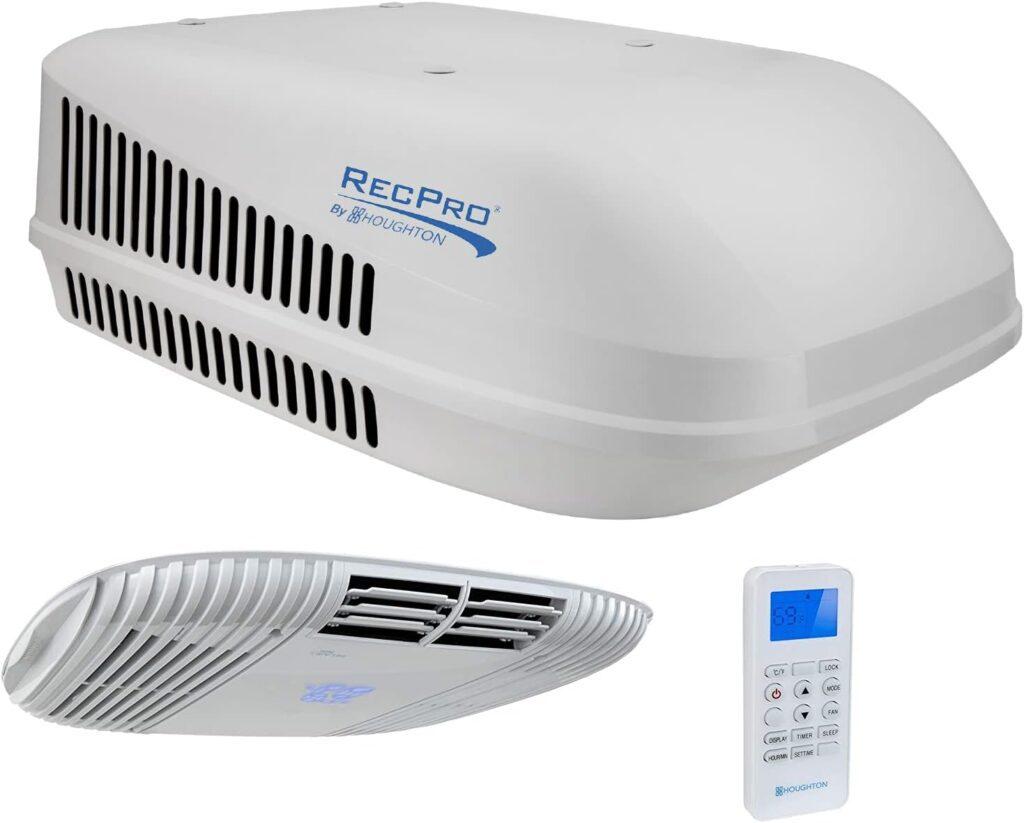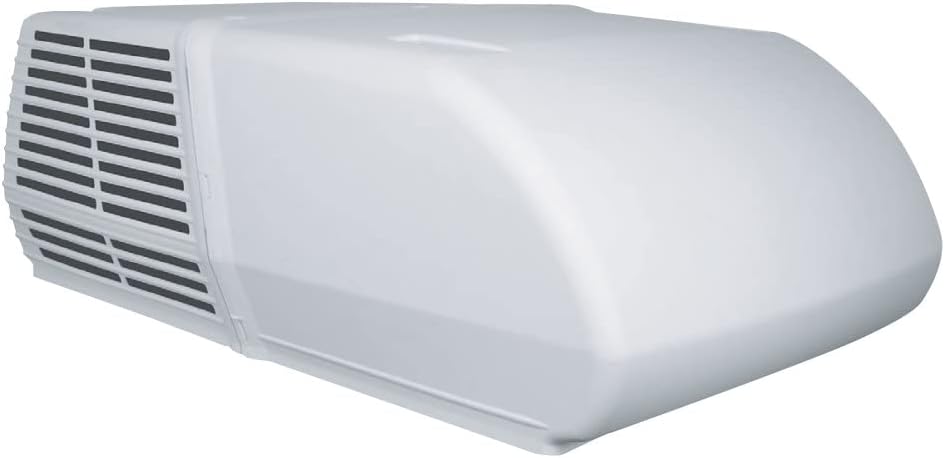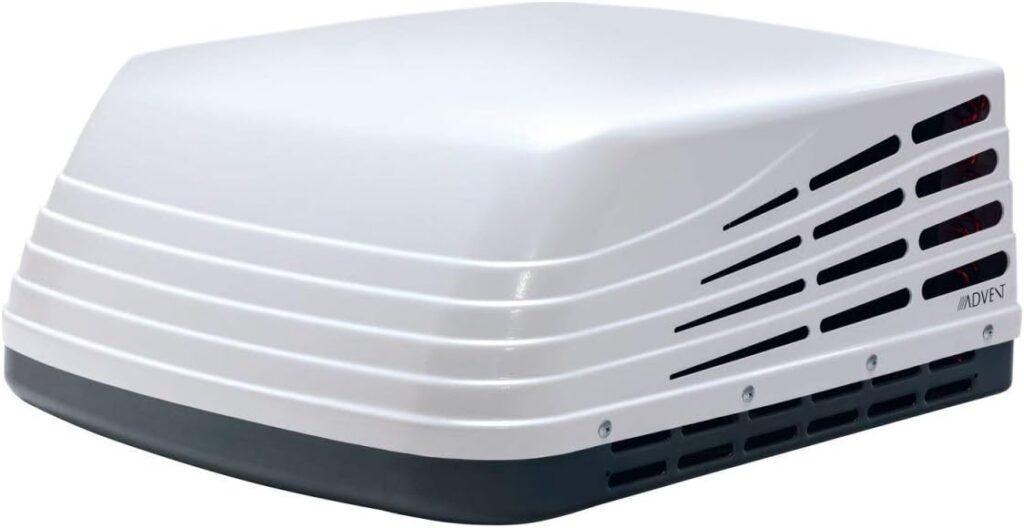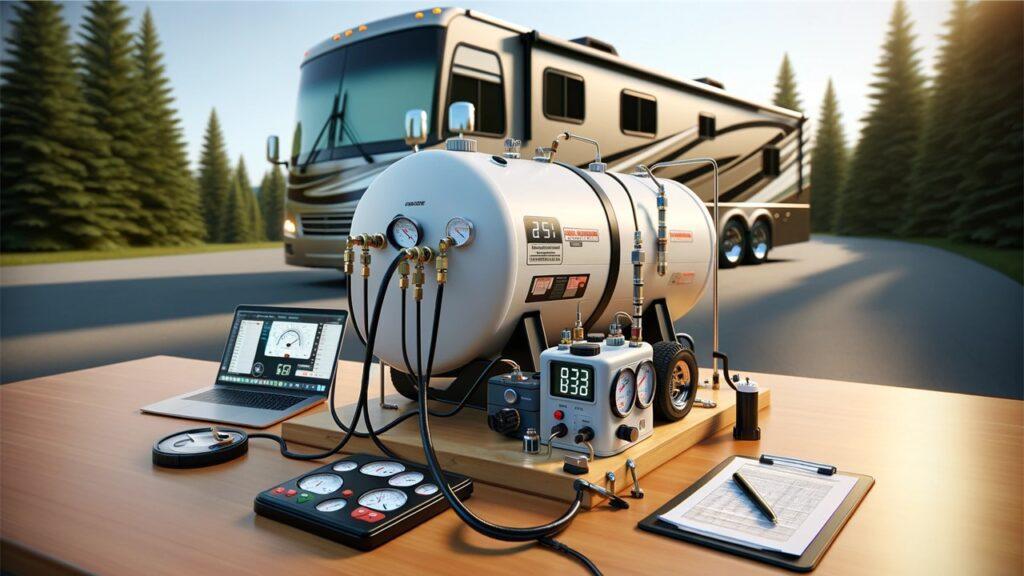Embarking on a van life journey or enjoying RV camping requires more than just a sense of adventure; it demands comfort and reliability in every aspect of your travel gear, especially when it comes to cooling systems. One critical piece that should never be overlooked is the RV 115 Volt air conditioner—a cornerstone for maintaining a comfortable climate, no matter where the road takes you. In this guide, we have extensively researched, reviewed, and ranked the 5 best RV 115 Volt air conditioners for van life on road cooling solutions in 2024. This ensures you can choose the right 115 Volt air conditioner for your RV from the many choices.
We’re reader-supported. When you buy through links on our site, we may earn an affiliate commission. As an Amazon Associate, we earn from qualifying purchases.
Our Top Picks Of The 5 Best RV 115 Volt Air Conditioners for Van Life In 2024
1. Best Overall: RecPro RV Air Conditioner 15K
2. Best Value Option: Coleman Mach 15+ A/C Unit
3. Best Budget Option: ASA Electronics ACM135 Advent Air
4. Best Low Profile Option: FOGATTI RV Air Conditioner
5. Best for Small Camper Van: RecPro RV Air Conditioner 13.5K
What Is The Best RV 115 Volt Air Conditioner?
Choosing the best RV 115 Volt air conditioner involves more than just picking a model. It requires considering your specific RV lifestyle and travel needs. Furthermore, the ideal unit should balance efficiency with robust cooling power, ensuring your RV motorhome remains a haven of comfort, regardless of the external temperatures.
1. Best Overall: RecPro RV Air Conditioner 15K

Key Specifications
- Brand: RecPro
- Cool/Heat Capacity: 15000 BTU
- Product Dimensions: 39.5″D x 25.5″W x 13.5″H
- Voltage: 115 Volts
- Noise Level: 59.1 dB (High Speed), 55.4 dB (Low Speed)
- Special Features: Remote Controlled, Dehumidifier, Touch Screen LED Display
In our view, the RecPro RV Air Conditioner 15K stands out for several reasons. It’s been a game-changer in our travels, keeping our camper van comfortably cool and dry, even in the most humid climates. The unit’s dual capability of cooling and heating makes it versatile across all seasons. Furthermore, its low energy consumption means we can run our AC without constantly worrying about draining the RV’s power resources.
One of the most appealing aspects of this model is its whisper-quiet operation. At just 55.4 decibels on high setting, it’s about as loud as a gentle rain, ensuring our nights are peaceful and undisturbed. The touch screen LED display also makes adjustments a breeze, enhancing our overall user experience with modern convenience.
Pros
- Energy efficient, drawing less power which is ideal for extended use.
- Operates quietly, ensuring a peaceful environment, perfect for relaxing or sleeping.
- Includes a dehumidifying feature that effectively reduces moisture for added comfort.
- Features a user-friendly interface with a touch screen and remote control for easy adjustments.
Cons
- At over 100 pounds, the unit may require additional help for installation.
- The outdoor unit can be noticeably louder, which might be an issue when spending time outside the RV.
From our standpoint, the RecPro RV Air Conditioner 15K is an excellent choice for RV owners looking for a reliable air conditioning solution. It blends efficiency, functionality, and user-centric design in one compact unit. While it’s robust, the benefits far outweigh the minor inconvenience of its weight and outdoor noise. Thus, it secures a well-deserved spot as the top air conditioner in our list, offering a well-rounded solution for RVers aiming for comfort on the road in our opinion.
2. Best Value Option: Coleman Mach 15+ A/C Unit


Key Specifications
- Brand: Coleman
- Cool/Heat Capacity: 15,000 BTU Cooling / 5,600 BTU Heating
- Product Dimensions: 28″D x 42″W x 16″H
- Voltage: 120 Volts
- Noise Level: 28 dB
- Special Features: Strong, Eco-friendly
In our journey to find an air conditioner that offers both exceptional performance and value, the Coleman Mach 15+ has consistently impressed us. It’s not just another AC unit; it’s a powerhouse capable of handling the diverse climates we’ve encountered on the road. With its strong airflow and eco-friendly R-410A refrigerant, this unit keeps our living space pleasantly cool while also being kinder to the environment.
What sets the Coleman Mach 15+ apart is its incredible efficiency and cooling capacity. Despite its robust output, the unit operates quietly, a mere whisper compared to other models we’ve used. This feature is a significant plus, allowing us to enjoy peaceful nights even during the hottest months. Moreover, the installation process was straightforward, and we appreciated how quickly it integrated into our existing system.
Pros
- Extremely powerful cooling capacity, ideal for larger RVs or hotter climates.
- Operates at a surprisingly quiet 28 dB, ensuring minimal disruption.
- Eco-friendly design uses R-410A refrigerant, reducing its environmental impact.
- Strong airflow of 320 CFM makes it effective for ducted systems.
Cons
- The size and weight of the unit may require more than one person for installation.
- Requires regular maintenance to maintain efficiency and performance.
From our standpoint, the Coleman Mach 15+ air conditioner has earned its spot in our list not by being just good enough but by excelling where it counts. It combines strong performance with environmental responsibility, making it an excellent choice for anyone looking to invest in their comfort without compromising on values in our list. Its robust construction and powerful cooling make it a standout option, especially for those who face extreme weather during their travels in our opinion.
3. Best Budget Option: ASA Electronics ACM135 Advent Air


Key Specifications
- Brand: ASA Electronics
- Cool/Heat Capacity: 13,500 BTU
- Product Dimensions: 33.46″W x 25.6″D x 15″H
- Voltage: 115 Volts
- Special Features: 3 Speed Fan, Optional Heat Strip
In our quest to find a budget-friendly air conditioner that doesn’t skimp on performance, the ASA Electronics ACM135 Advent Air has consistently impressed us. This unit is not just affordable; it’s a powerhouse in its own right, designed to tackle the varied environments we encounter on the road. With 13,500 BTUs of cooling power and three fan speeds, it keeps our camper feeling pleasant even on the warmest days.
One standout feature is its rigid, metal constructed base pan which adds an extra layer of durability. Moreover, the installation was a breeze—fitting perfectly into the standard vent opening, making it a straightforward upgrade from older units. The option to add a heat strip makes it versatile for use in colder weather, extending its utility beyond just the summer months.
Pros
- Robust cooling performance makes it suitable for most small to mid-sized RVs.
- Three fan speeds allow for adjustable comfort levels.
- The metal base pan enhances durability and longevity.
- Installation is simple and fits standard openings, great for DIY enthusiasts.
Cons
- The unit is a bit heavier than some other models, which could complicate installation.
- It operates slightly louder than some higher-end models, which might be noticeable in quieter settings.
From our perspective, the ASA Electronics ACM135 Advent Air stands out as an excellent choice for those who need reliable cooling without breaking the bank. It strikes a fine balance between cost and capability, making it a standout option in our list of air conditioners. Whether you’re upgrading an old unit or outfitting a new RV, this air conditioner could be the right fit for your needs, offering solid performance throughout its service life in our opinion.
4. Best Low Profile Option: FOGATTI RV Air Conditioner


Key Specifications
- Brand: FOGATTI
- Cooling Power: 13,500 BTU
- Product Dimensions: 29.5″D x 27.6″W x 14.2″H
- Voltage: 115 Volts (AC)
- Noise Level: 65 dB
- Special Features: Fast Cooling, UV-resistant material
From our experience, the FOGATTI RV Air Conditioner has proven to be an exceptional choice for those in need of a low-profile yet powerful cooling solution. Its compact design does not compromise on performance; it cools quickly and efficiently, making it perfect for our RV travels during the hotter months. The installation process was straightforward, thanks to the clear instructions and included an air distribution box.
This unit’s ability to rapidly cool our living space has been a game changer. Within minutes of turning it on, we feel the difference, even in large areas of our RV. Additionally, its operation is impressively quiet, ensuring that our comfort comes without the nuisance of loud operational noise. The robust LG air compressor and dual shaft motor work together to deliver a cooling experience that’s both swift and silent.
Pros
- Efficiently cools large spaces quickly, ideal for urgent cooling needs.
- Operates quietly, blending seamlessly into the background noise of daily life.
- Durable construction with UV-resistant materials protects against sun damage.
- EPP foam wrapping on internal air ducts enhances insulation and protection.
Cons
- At 65 dB, the noise level might be noticeable in smaller, more enclosed spaces.
- The unit’s advanced features may require a bit of a learning curve for optimal use.
From our perspective, the FOGATTI RV Air Conditioner is an excellent choice for anyone seeking a low-profile air conditioner that doesn’t skimp on cooling power. It stands out in our list for its efficient performance and sleek design, fitting seamlessly into most RV setups without the bulk of traditional units. Whether you’re dealing with intense summer heat or just need a quick cool down, this air conditioner meets the challenge gracefully, making it a solid addition to any RV in our opinion.
5. Best for Small Camper Van: RecPro RV Air Conditioner 13.5K


Key Specifications
- Brand: RecPro
- Cool/Heat Capacity: 13,500 BTU
- Product Dimensions: 39.5″D x 25.5″W x 13.5″H
- Voltage: 115 Volts
- Noise Level: 59.7 dB
- Special Features: Remote Controlled, Dehumidifier
From our adventures, the RecPro RV Air Conditioner 13.5K has emerged as a standout for small camper vans. Its compact size belies its robust cooling capacity, making it an ideal fit for smaller spaces where efficiency and functionality are key. The unit’s low amp draw is particularly appealing, allowing us to enjoy cool air without overburdening our van’s electrical system.
This air conditioner not only cools quickly but also operates quietly, which is essential in the close quarters of a small camper van. The added dehumidifying function ensures the air remains dry and comfortable, tackling the muggy feeling that can sometimes set in after a rainy day. Plus, the ease of use provided by the remote control and touch screen LED display allows for effortless adjustments, even from a distance.
Pros
- Proper size for small camper vans, ensuring efficient space usage.
- Low energy consumption allows for extended use without draining resources.
- Quiet operation maintains peace and tranquility inside the van.
- Dehumidifier feature keeps the interior comfortable and mold-free.
Cons
- The noise level, while low, may still be noticeable in very small interiors.
- The exterior plastic design, although durable, might not suit those looking for a more rugged look.
In our opinion, the RecPro RV Air Conditioner 13.5K is an excellent choice for anyone with a small camper van. It’s powerful enough to handle the demands of hot weather while being compact and energy-efficient. This unit balances performance with convenience, making it a top pick in our list for those who value both comfort and practicality in their travel setups. Whether you’re parked at a scenic overlook or traveling the open road, this air conditioner ensures your small space is always just the right temperature from our perspective.
What Is An RV 115 Volt Air Conditioner?
When embarking on an extended road trip or living the RV lifestyle, comfort is a non-negotiable. At the heart of this comfort during the warmer months is the RV 115 volt air conditioner. This technology specifically caters to the unique power systems of recreational vehicles, ensuring that cooling systems run smoothly without overtaxing the RV’s electrical setup. Moreover, an RV 115 volt air conditioner efficiently manages the climate inside your motorhome or camper, regardless of the sweltering conditions outside.
The primary allure of the 115 volt RV climate control units lies in their specialized design for RV use. Unlike standard residential AC units that often require higher voltage, these are tailored to operate optimally at 115 volts, which is ideal for RVs and travel trailers where power efficiency is crucial. Furthermore, this specific voltage helps prevent the common issues of circuit overloads in RVs, ensuring your travels are safe and comfortable.
Additionally, the differences between 115 volt RV cooling systems and other air conditioning systems include not just the operational voltage but also their adaptation to RV environments. Recreational vehicle 115V AC units are compact, designed to fit into the limited space of a camper or caravan, and are built to withstand the vibrations and conditions associated with road travel.
Understanding the specifics of RV 115 volt air conditioners can significantly enhance your road travel experience, by ensuring your vehicle remains a cool, welcoming retreat after a day of adventure.
Benefits of Choosing a 115 Volt Air Conditioner for Your RV
Choosing the right air conditioner for your RV involves various factors, but opting for a 115 volt RV climate control unit brings several distinct advantages. Firstly, the energy efficiency of these units can’t be overstated. They are designed to use less power without compromising on cooling capacity, which is crucial when managing energy resources in a mobile home.
Moreover, the compatibility of 115 volt RV cooling systems with standard RV power setups means that integration is seamless and straightforward. This compatibility ensures that you can install these systems in almost any RV, motorhome, or travel trailer without needing significant modifications or upgrades to the electrical infrastructure. Furthermore, the adaptability of these units makes them a versatile choice for various types of RVs.
Ease of installation and maintenance also marks a significant benefit of these camper 115V air conditioning systems. Many models come with user-friendly installation kits and clear instructions, allowing RV owners to undertake the installation themselves if they choose. Additionally, maintenance requirements are generally minimal, ensuring that you spend more time enjoying your vacation and less on upkeep.
The benefits of 115 volt air conditioners for RVs extend beyond mere cooling. They provide an efficient, compatible, and easy-to-maintain solution that enhances the comfort of your RV experiences. Whether you’re a weekend warrior or a full-time road explorer, these systems ensure your mobile sanctuary remains comfortable and inviting.
Do You Need RV 115 Volt Air Conditioners for Your RV?
Whether you need an RV 115 volt air conditioner depends significantly on your travel lifestyle and comfort requirements. RV rooftop 115V AC systems are ideal for maintaining a cool and comfortable environment within your recreational vehicle, crucial for those traveling in warmer climates or during the hotter months of the year. Additionally, if your travel plans include regions where the temperatures soar, an efficient cooling system is not just a luxury but a necessity.
How To Choose the Right 115 Volt Air Conditioner for Your RV
Selecting the perfect RV 115 volt air conditioner requires careful consideration of several critical factors. This guide will walk you through the essential steps to ensure you make the best choice for your RV, motorhome, or camper.
- Assess Your RV’s Power Capacity: Begin by confirming that your RV’s electrical system can support a 115 volt system. This step is crucial to avoid overload and ensure seamless integration.
- Determine the Appropriate Size: Size is paramount when choosing your RV 115 volt air conditioner. Consider the size of your RV and the area you need to cool to select an appropriately sized unit.
- Consider Energy Efficiency: Opt for a model that offers good energy efficiency. Efficient units reduce electricity usage, saving you money and conserving energy.
- Review Installation Requirements: Some RV 115 volt cooling systems may require professional installation, while others can be installed by the RV owner. Choose one that fits your skill level and budget for installation.
- Check for Additional Features: Features like digital controls, remote operations, and programmable timers enhance convenience and functionality. Evaluate which features are most important for your comfort and lifestyle.
Your choice in a 115 volt RV climate control unit can greatly impact the comfort and enjoyment of your RV travels. Take time to consider your specific needs and preferences, evaluate the models available, and choose one that offers the best balance of size, efficiency, and features. By following these steps, you can enhance your travels and ensure your RV feels like a cool, inviting home away from home.
Installation of 115 Volt Air Conditioners in RVs
Installing an RV 115 volt air conditioner is a critical step in enhancing the comfort of your recreational vehicle. Proper installation ensures efficient operation and longevity of the unit, making your RV a cool refuge during your travels. Whether you’re a hands-on DIY enthusiast or prefer professional help, understanding the installation process is essential.
DIY Installation
Installing a 115 volt RV climate control unit yourself can be a rewarding project. Here’s a straightforward guide to help you through the process:
- Preparation: Ensure that your RV is compatible with a 115 volt system. Gather all necessary tools and materials before you start, including a screwdriver, sealant, and the mounting hardware typically included with the AC unit.
- Mounting the AC Unit: Most RV 115 volt air conditioners are designed for rooftop installation. Carefully place the unit on the roof cutout and secure it using the provided mounting brackets and screws.
- Wiring: Connect the electrical wires to your RV’s power system. It’s crucial to follow the wiring diagram provided by the manufacturer to avoid any electrical mishaps.
- Sealing: Apply a waterproof sealant around the base of the unit to prevent leaks during rain. Ensure all openings are well-sealed.
- Testing: Once installed, test the air conditioner to ensure it operates correctly. Check for any unusual noises or vibrations.
When to Hire a Professional for AC Installation
While DIY projects can be satisfying, there are situations where professional installation of your RV 115 volt air conditioner is advisable:
- Complex Electrical Systems: If your RV has a complex electrical system or you’re unsure about handling electrical components, it’s safer to hire a professional.
- Warranty Concerns: Some warranties might require professional installation to remain valid. Check your warranty terms before deciding.
- Lack of Tools or Experience: If you lack the necessary tools or are not confident in your ability to install the unit safely, professional installation is recommended.
Choosing the right service provider involves ensuring they have experience with RV air conditioning systems and checking their credentials and customer reviews. A reliable professional will provide a smooth installation process and peace of mind.
How To Properly Use and Maintain 115 Volt Air Conditioners in Your RVs
Effective usage and maintenance of your RV 115 volt air conditioner are crucial for optimal performance and durability. Proper care ensures your RV remains comfortable regardless of the external temperatures, and can significantly extend the lifespan of your unit.
- Regular Cleaning: Keep the air filters clean and check them monthly. Clean or replace filters to ensure efficient airflow and cooling performance.
- Check for Leaks: Regularly inspect your AC unit for any leaks or damage, especially after extensive travel. Early detection of issues can prevent costly repairs.
- Seasonal Inspections: Before the peak travel seasons, inspect your air conditioner to ensure it’s operating efficiently. This may include checking coolant levels and cleaning condenser coils.
- Operational Right Practices: Run your RV air conditioner for a few minutes every month, even in the off-season. This practice helps keep the system lubricated and functioning properly.
Adhering to these maintenance tips will help maintain the efficiency and reliability of your RV 115 volt air conditioning system, ensuring it provides consistent cooling whenever you hit the road.
Pros and Cons of 115 Volt AC vs. Other Types
When it comes to cooling your RV, the choice between RV 115 volt air conditioners and alternatives like 12V, 24V, or solar-powered systems isn’t just about preference—it’s about matching your system to your RV lifestyle. RV 115 volt air conditioners excel in environments where robust cooling is non-negotiable. They’re perfect for larger RVs and for travelers who don’t want to compromise on comfort, handling high temperatures with ease and providing consistent cooling throughout your vehicle.
However, if your travels take you off the beaten path, or if you’re conscious of energy use, lower voltage systems might be more up your alley. These units consume less power, making them ideal companions for lighter travel setups or smaller spaces. They’re particularly handy when you’re parked far from conventional power sources or when you want to keep things quiet and low-key.
While the heftier RV 115 volt air conditioners are your best bet for extensive use and larger spaces, the more nimble 12V or 24V systems—or even a solar-powered setup—could better suit your needs if you prioritize energy efficiency or travel frequently off-grid. The key is knowing what kind of traveler you are and what kind of journey you intend to embark on.
Why Some RVers Choose Alternatives Over 115 Volt ACs
There’s a growing trend among RVers to opt for alternative cooling solutions over traditional RV 115 volt air conditioners. This shift is often driven by a desire for sustainability and efficiency. For example, if you spend a lot of time in locales where sunshine is abundant, a solar-powered air conditioner might not just be a viable option—it could be the most effective one. These systems harness the power of the sun, slashing utility costs and reducing reliance on RV park hook-ups.
On the other hand, if your RVing style involves shorter trips or less frequent use of air conditioning, investing in a less powerful unit like a 12V or 24V might make more sense. These systems are easier on your battery and generator, allowing you to explore with less planning around power needs.
Moreover, the long-term perks of going with an alternative option can be quite appealing. Not only do these systems help reduce your carbon footprint, but they also tend to require less maintenance and can offer a quieter operation—perfect for those peaceful nights in the wilderness.
So, while RV 115 volt air conditioners are a solid choice for many, considering alternatives can offer benefits that align more closely with a sustainable, efficient RV lifestyle. Deciding on the right system is all about understanding your travel patterns and choosing a solution that enhances your experience on the road.
Wrapping It Up!
Selecting the perfect air conditioner for your RV isn’t merely a task—it’s pivotal in guaranteeing your road trips are both comfortable and memorable. Opting for an RV 115-volt air conditioner equates to selecting reliability. Tailored to meet the unique demands of RV living, this type of air conditioner ensures your onboard sanctuary remains refreshingly cool, even amidst scorching summer temperatures.
Choosing a 115-volt system also translates to investing in peace of mind. These units are crafted for energy efficiency, allowing you to revel in your travels without fretting over excessive power usage or straining your RV’s electrical setup. Additionally, they typically boast straightforward installation and maintenance, minimizing time spent on upkeep and maximizing opportunities for exploration, relaxation, and cherished moments.
In the world of mobile cooling solutions, opting for a sturdy RV 115-volt air conditioner stands as a savvy decision. It’s not just about combating the heat; it’s about guaranteeing every journey is characterized by optimum comfort. Whether embarking on a brief weekend escape or embarking on an epic cross-country odyssey, a dependable air conditioning setup can markedly elevate your travel experience, allowing you to focus on the delights of the excursion rather than weather-induced discomforts.
As you prepare for your forthcoming adventure, bear in mind that a quality 115-volt air conditioner isn’t merely an accessory—it’s your gateway to a smoother, more gratifying journey aboard your RV.
Related FAQs
What Size RV 115 Volt Air Conditioner Do I Need?
The size depends on your RV’s square footage and insulation quality.
How Often Should I Maintain My RV 115 Volt Air Conditioner?
Regular maintenance, including filter changes and checks, should be done every season.
Can I Install an RV 115 Volt Air Conditioner Myself?
Yes, if you’re handy and follow the manufacturer’s instructions carefully.
What Are the Running Costs of an RV 115 Volt Air Conditioner?
Costs vary by model efficiency and how frequently you use it.
Are RV 115 Volt Air Conditioners Noisy?
Noise levels depend on the model, but newer units are designed to be quieter.
As outdoor enthusiasts ourselves, we understand the significance of reliable gear that can withstand the elements and support you throughout your journey. We try to provide as much real life information with our guides and how tos to the readers as possible. Our honest and transparent reviews of essential outdoor gadgets and products are rooted in testing and experience. We take great satisfaction in offering unbiased evaluations, ensuring that you can make informed decisions when investing in outdoor gear. As an affiliate website, we may earn a small commission from some of the products we feature. However, rest assured that our opinions are not influenced by this, and your trust is always our top priority.



